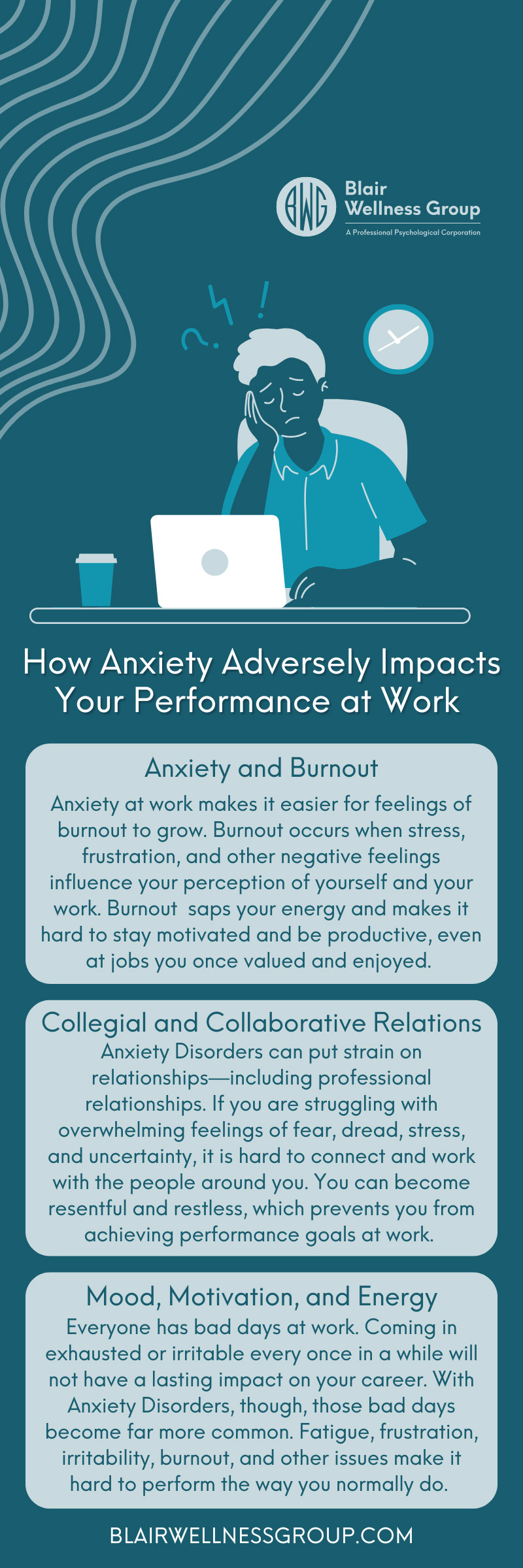Anxiety, like all Mental Health Disorders, is more than an abstract idea or fantasy that occurs in your own head. Anxiety Disorders are real medical conditions that affect your entire life—including your professional life. Worry, fear, stress, doubt, and other symptoms of Anxiety Disorders can keep you stuck, hold you back from pursuing your dreams, or being able to achieve exceptional and remarkable milestones in your life and career.
Anxiety creates new challenges in your daily routine. It prevents you from taking on new opportunities due to worry or fear. These experiences keep you from reaching your full potential in the workplace, at home, and keep you stuck in the world of uncertainty and fear. Worse, they can hinder your work performance and cause you to slow down or stagnate in your career.
They do not have to define your future and prevent you from changing the trajectory of your life. With professional intervention and a personalized treatment plan from a Licensed Clinical Psychologist, you can identify how anxiety adversely affects your performance at work and correct the problem before it gets worse and takes you on a downward spiral. Learn more about Anxiety Disorders in the workplace and in your life to find the help you need for your Mental Health with this guide.
Emotional Symptoms of Anxiety Disorders
It is easy to confuse anxiety symptoms with normal stress or worry—especially if you have been experiencing a stressful time at work lately. However, paying attention to how you feel and how those feelings change over time helps you accurately identify your Anxiety Disorder for what it is. This is the first step to effectively address workplace anxiety and improve your career and well-being both at home and at work.
Emotional symptoms of Anxiety Disorders include feelings of nervousness, tension, fatigue, uneasiness, and restlessness. You might always feel that there is danger just around the corner, which can lead to feelings of doom, anxiety, insecurity, unsafety, or panic. Mental fatigue and difficulty concentrating are also indicators of ongoing Anxiety Disorders.
Physical Symptoms of Anxiety
Anxiety Disorders also negatively affect your physical health and impair your ability to perform in an optimal manner throughout the day. Fatigue is a major indicator of ongoing or overwhelming feelings of anxiety. You might have trouble falling asleep or staying asleep at night. This restlessness leaves you feeling weak, tired, and drained during the day.
Muscle tension is also a common indicator of Anxiety Disorders. Pent-up tension and stress can cause muscle aches, headaches, and other similar symptoms. Additionally, you might experience an increased heart rate, rapid breathing, sweating, or trembling—especially during moments of severe worry, dread, or panic.
If you experience these symptoms more frequently in the workplace or if you notice them alongside increased feelings of worry, fear, and stress, it is time to talk to a Licensed Clinical Psychologist about Anxiety Disorders.
Causes of Workplace Anxiety
There are many potential causes of Anxiety Disorders, including genetic predisposition or comorbid physical or Mental Health Conditions. However, your work itself can also be a source of anxiety and anxiety-related disorders, which can stem from poor emotional regulation, poor sense of self, comorbid addictions, such as Addiction Disorders, Traumas, Personality Disorders, and other Mood Disorders.
Particularly stressful times—such as busy holiday seasons or periods of big change for your business—can lead to more feelings of tension, stress, restlessness, fear, and anxiety. Excessive pressure and responsibility might also play a key role in negatively impacting your day-to-day life. If you are pushing yourself toward a significant goal, such as a promotion or other career milestone, you can end up shouldering an unhealthy amount of pressure. If you do not live up to the expectations placed on you at home or by your friends and family members, you may experience stress, worry, shame, and other negative emotions.
No matter where your Anxiety Disorder originates from, it can negatively impact your performance at work if you do not seek the necessary interventions and customized treatment plans under the care of a Licensed Clinical Psychologist.
Anxiety and Burnout
Anxiety at work makes it easier for feelings of burnout to grow. Burnout occurs when stress, frustration, and other negative feelings influence your perception of yourself and your work. Many people tend to ignore stress and frustration at work, thinking that it is not a big deal or that it will go away on its own. However, this only causes these feelings to fester and worsen over time. As a result, stress and anger lead to exhaustion, cynicism, and inefficacy. You view yourself, your colleagues, and your workplace in a negative light. You also detach and dissociate yourself from your work, losing any personal motivation or pride in what you do and how you perform.
Burnout can make it feel as if your career is grinding to a devastating halt. It saps your energy and makes it hard to stay motivated and be productive, even at jobs you once valued and enjoyed. It can also affect your ability to collaborate with coworkers, meet deadlines, and be actively engaged and present in your day-to-day work—which creates even more stress and adds to your feelings of anxiety.
Collegial and Collaborative Relations
Anxiety Disorders can put strain on relationships—including professional relationships. If you are struggling with overwhelming feelings of fear, dread, stress, and uncertainty, it is hard to connect and work with the people around you. You can become resentful and restless, which prevents you from achieving performance goals at work. Moreover, your lack of energy and struggles with motivation can lead to frustration from your colleagues and partners.
Without clinical and skilled intervention under the care of a Licensed Clinical Psychologist, Anxiety Disorders can also lead to irritability, anger issues, addictive behaviors, anger outbursts, volatility, inability to meet goals, and a short temper, which also creates challenges when trying to communicate and collaborate with others. These problems build over time, creating tension between you and your colleagues and adding to your workplace stress.
Mood, Motivation, and Energy
Everyone has bad days at work. Coming in exhausted or irritable every once in a while will not have a lasting impact on your career. With Anxiety Disorders, though, those bad days become far more common. Fatigue, frustration, irritability, burnout, and other issues make it hard to perform the way you normally do. This change in energy can lead to you falling behind in your work, struggling with deadlines, and missing on opportunities for growth, promotions, and more.
When Is It Time To Seek Help?
In some cases, anxiety is a normal part of having a job. Feeling nervous before a big presentation or dealing with stress ahead of a significant deadline are normal experiences. This makes it difficult to tell the difference between average feelings of anxiety and an actual Anxiety Disorder.
One of the biggest indicators to pay attention to is how your feelings of worry or stress impact your overall life. When negative emotions start to become so overwhelming that they take over your day or have lasting consequences on your work performance, there is something wrong.
A Licensed Clinical Psychologist can help you understand the stress, anxiety, and other negative experiences you face. With professional intervention, you can identify Anxiety Disorders for what they are and better understand how they influence your work and other aspects of your life.
If you are looking for Anxiety Treatment from a Licensed Clinical Psychologist, contact Blair Wellness Group to see how our evidence-based treatment plans can help you.

Dr. Cassidy Blair is a renowned Licensed Clinical Psychologist and trusted Performance Coach who specializes in providing Concierge-Psychological Care and Executive Coaching for high-achieving professionals. With a deep understanding of the unique challenges faced by CEOs, executives, entrepreneurs, and leaders, Dr. Blair offers tailored, confidential care designed to foster emotional well-being, personal growth, and professional excellence. Her clientele values her discretion, clinical expertise, and emotionally intelligent approach to navigating complex personal and professional dynamics.
- This author does not have any more posts.




